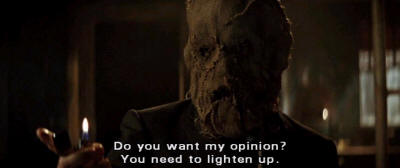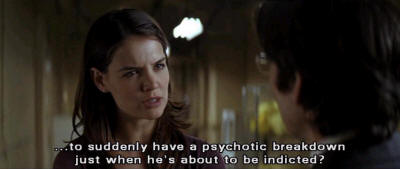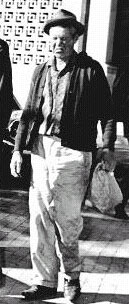|
"Persona: That which
in reality you are not, but which yourself as well as others
think you are ... in dreams it could appear as a
scarecrow, a
tramp or an
empty field."
-- Carl Jung
"[Scarecrow] I haven't got a brain ...
only straw."
-- The Wizard of Oz, by
L. Frank Baum (The French
Bomb)
"When I saw him
[Hitler] with my own
eyes, he suggested a psychic scarecrow (with a broomstick
for an outstretched arm) rather than a human being.”
-- Carl
Jung
"Stories such as Braden's -- and they are legion -- helped
to make Angleton a sinister and mysterious figure inside
the CIA, and in the tight social circles in Washington in
which he moved. His
nicknames reflected this. In the CIA, his agency pseudonym
-- used in cable traffic -- was Hugh Ashmead. But his
colleagues referred to him variously as
"the Gray Ghost,"
"the Black Knight,"
"the Orchid Man,"
"the Fisherman,"
"Jesus,"
"Slim Jim," or less flatteringly, "Skinny Jim," or
"Scarecrow." In the dull bureaucracy of
Washington, and even in the secret intelligence bureaucracy,
few officials had such colorful sobriquets."
--
Molehunt, by David Wise

Angleton was a poet,
or at least he had been deeply involved in poetry at Yale,
an admirer of T. S. Eliot and Ezra Pound, and this
aesthetic side, combined with the enormous secret power he
wielded, made him a unique figure in the CIA and added to
the ominous shadow he cast. For it was precisely this blend
of poet and spy, of art and espionage -- a craft with a
suggestion of violence always present just below the surface
-- that added to the hint of menace in Angleton's persona.
As a literary intellectual, he must have appreciated the
delicious dramatic irony that he embodied. [7] [7.
Pound, the controversial poet and Fascist sympathizer, was,
like Angleton, a native of Idaho. He moved to Italy in 1924,
and during World War II he broadcast propaganda, directed at
Allied troops, for the Mussolini government.
Indicted for treason and brought back to the United States
for trial, he was judged mentally incompetent and confined
to St. Elizabeth's Hospital in Washington for twelve years.
He returned to Italy after his release and died there in
1972 at the age of eighty-seven.]
--
Molehunt, by David Wise

"[Rachel] Isn't it convenient for a
52-year-old man who has no history of mental illness to suddenly have a psychotic breakdown
just when he's about to be indicted? ... He's drugged?
[Crane]
Psychopharmacology is my primary field.
--
Batman Begins, directed by Christopher Nolan
"It always starts with
nonsense," Simon is telling Joe in another time-track,
between Los Angeles and San Francisco, in 1969. "Weishaupt
discovered the Law of Fives while he was stoned and looking
at one of those shoggoth pictures you saw in
Arkham. He imagined the
shoggoth was a rabbit and said, 'du hexen Hase,' which has
been preserved as an in-joke by Illuminati agents in
Hollywood. It runs through the Bugs Bunny cartoons: 'You
wascal wabbit!' But out of that schizzy mixture of
hallucination and logomania, Weishaupt saw both the mystic
meaning of the Five and its pragmatic application as a
principal of international espionage, using permutations and
combinations that I'll explain when we have a pencil and
paper."
--
The Illuminatus! Trilogy, by Robert Shea and
Robert Anton Wilson
"Four months after the
OSS closed up shop, Truman, on January 22, 1946, issued an
executive order setting up a National Intelligence Authority
and, under it, a Central Intelligence Group, which became
the forerunner of the CIA. The Authority's members were
Secretary of State James F. Byrnes, Secretary of War Robert
P. Patterson, Secretary of the Navy James V. Forrestal and
Admiral Leahy. The Central Intelligence Group was the
Authority's operating arm. To head it, Truman selected Rear
Admiral Sidney W. Souers, the deputy chief of Navy
Intelligence.
Souers had been a businessman in St. Louis before the war;
the nation's first Director of Central Intelligence once
headed the Piggly Wiggly Stores in Memphis.
-- The Invisible Government,
by David Wise and Thomas B. Ross
"The [FBI] agents appeared convinced that the
CIA harbored homosexuals. They kept coming back to that
subject. "The FBI asked about why there were so many
'queers' in the CIA's German stations in the early 1950s."
--
Molehunt, by David Wise
"Emerald City is the Gulf Coast's premier
gay/high-energy dance bar."

"Around 1975, I was in a phone booth in Maryland somewhere,
when I saw a poster on a telephone pole about who killed JFK,
and it had a picture of the three tramps. I saw that picture
and I fucking -- like a cartoon character, my jaw dropped,
my eyes popped out of my head, and smoke came out of my
ears. It looks like my dad. There's nobody that has all
those same facial features. People say it's not him. He's
said it's not him. But I'm his son, and I've got a gut
feeling."
-- The Last
Confessions of E. Howard Hunt, by Erik Hedegaard

|